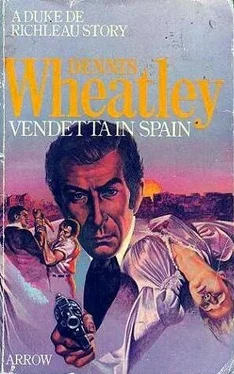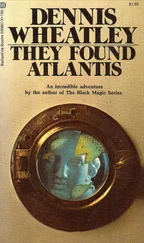Again they remained silent for a minute while the Duke strove desperately to think of a way out. Then the Lieutenant said, 'Your best plan is to cut out the fireworks about your being the King of Siam and plead that you shot this fellow in self-defence.'
T did. If I hadn't shot him he would have shot me. But do you think the Court will believe that?'
T doubt it,' again the young man fingered his moustache, 'still, it's about your only chance.'
As he was speaking a key grated in the lock, and the door was thrown open. Navarez stepped out into the corridor and two warders entered the cell. One of them snapped a handcuff on to the Duke's right wrist and snapped the other on to his own left wrist. Then they filed out and up to the ground floor of the building.
In front of it a prison van was waiting. As the Duke stepped out into the bright morning sunshine, he cast a swift look up and down the street. There were plenty of people in it going about their morning's business. If he could have cut and run for it he might have got away in the crowd. But as he was handcuffed to the warder such an attempt was out of the question. Filled now with such apprehension that he had broken out into a slight sweat, he allowed himself to be hustled into the van.
It set off at a trot, then as its pace slowed he knew that the horses were drawing it up the long hill of Montjuich. All the time his brain was working furiously, but it had now become sterile of ideas by which he might attempt to save himself. His one hope lay in the chance that when it reached the fortress some member of the General's staff who knew him by sight might be about, so that he could shout to them for help. But when the van pulled up and he was pushed out of it he saw that it had halted on the far side of the fortress from the General's quarters. Two minutes later his warders had marched him through a door and down a passage into a small bleak waiting-room.
Navarez left them, and for ten minutes de Richleau remained there, still cudgelling his wits without avail. Now that he was alone with the two warders he contemplated the desperate step of attempting to overcome them. Had he been free he might have succeeded, but he was still handcuffed to one of them. He knew that even if he had knocked the man unconscious, he would never be able to get the key and unlock the steel bracelet while the other attacked him, before shouts brought some of the soldiers he had seen at the entrance to the fortress.
An N.C.O. appeared at the door of the room and beckoned to them. Turning, he led the way down the passage, the Duke and the warders following closely on his heels. They went out through a door and crossed a small courtyard.
Twelve soldiers and a sergeant were lounging near their stacked rifles. De Richleau needed no telling that they were the firing squad that Navarez had mentioned as always being kept in a state of readiness.
The north wall of the courtyard was blank, without doors or windows. Half-way along it and about four feet from the ground there showed a long, irregular patch where the stone-work had been pitted by innumerable bullets. Obviously it was there, with their backs to that stretch of wall, that during the past six weeks hundreds of mob-leaders, anarchists, syndicalists, Communists, and probably quite a number of honest but unlucky workers, had met their death. The Duke lowered his eyes and could not prevent a shudder running through him.
They passed through another door, turned right and entered a largish room furnished only with a number of deal tables, chairs and benches. In the middle of a long table at the far end of the room three officers were seated close together: a Major, a Captain and a Lieutenant. Anxiously the Duke scrutinized their faces in an endeavour to assess the characters of the three men who were about to try him. The Major was elderly, square-headed and somewhat morose-looking. De Richleau judged him to be past further promotion at his age, so probably disappointed in his career and a harsh disciplinarian. The Captain was about twenty-six, a dark, handsome fellow with a fine upturned moustache. The Lieutenant was a vapid-looking youth wearing a monocle.
At smaller tables to either side and a little in front of the long one two other officers were sitting; one was Lieutenant Navarez, the other - a dark round-faced man of about thirty - de Richleau knew would act as Prosecutor. To the latter's right and a little behind him Comandante Urgoiti was sitting. At a fourth table, forming a T with the long one at the top, there was another officer with a number of papers and books in front of him. He belonged to the Legal branch and was there to play the part of Clerk of the Court. At the same table there were two N.C.O.s with pens behind their ears. Except for a uniformed policeman and two men who looked like detectives, the benches were empty.
In the doorway the warder to whom the Duke was handcuffed quickly unlocked the bracelet round his wrist. Both warders stepped aside then went to sit on the bench next to the policeman. Two soldiers with rifles and fixed bayonets took their place one on either side of de Richleau and marched him up to the end of the middle table.
The Legal Officer asked his name, and he replied in a firm voice, 'Jean Armand Duplessis, tenth Duke de Richleau. I have been brought here owing to a most iniquitous . . .'
He got no further. The officer cut in. 'Your name is given on the charge sheet as Nicolai Chirikov.'
'That was a nom de guerre used by me only for a few weeks when I was here in 1906, seeking evidence to bring to justice certain anarchists believed to have been concerned in the wedding-day attempt on His Majesty King Alfonso. I arrived here three days ago for a similar purpose. I was received by General Quiroga and spent two nights as his guest. I . . .'
The Major, who was acting as the President of the Court, rapped sharply on the table with his gavel and said, 'The Prisoner seeks to waste the time of the Court. Expunge his remarks from the record and proceed.'
The few preliminaries were soon over and the charge read out: 'That the said Nicolai Chirikov, being temporarily employed as a member of the special police, did on the evening of September 10th wilfully kill by shooting Detective-Officer Rodrigo Veragua, who had gone out to the village of San Cugat in his company.'
To that de Richleau replied, 'Not Guilty. The man I shot was an anarchist named Ruben Pineda.'
Urgoiti whispered to the Prosecuting Officer, who rose and said, 'We shall bring evidence before the Court to show that the murdered man was in fact Rodrigo Veragua.'
The first witness was called: a frightened-looking old woman who, after a moment, the Duke recognized as the landlady of the pension at which he had stayed during his first visit to Barcelona. After peering at him she identified him as Nicolai Chirikov; upon which he said:
'I have already admitted to having carried out investigations to the advantage of the State under that name.'
'Silence!' said the President loudly. 'The Prisoner will speak only when he is addressed.'
The second witness was a foxy-looking little man who deposed that during August, 1906, he had been a frequenter of the branch of the Somaten that had premises down by the docks; that he had on several occasions seen the prisoner there and heard him talk with enthusiastic approval of the outrages committed by militant anarchists, and say that he had himself been exiled from Russia for nihilist activities.
De Richleau let that pass, only thinking grimly that Urgoiti must have spent a very busy night raking up these witnesses against him.
The third and fourth witnesses were the two detectives. They deposed to having been sent out to San Cugat the previous night at about half past ten. They then described the circumstances in which they had found Veragua's dead body and the injuries he had sustained. They also stated that they had known the dead man for a number of years as Rodrigo Veragua.
Читать дальше












